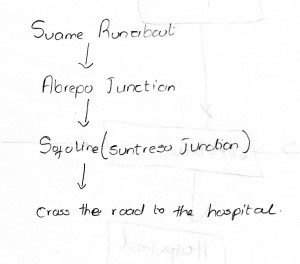Long-time Cyborgology readers might remember that last year I went to Kumasi, Ghana to install an automated SMS system to help Ghanaians find condoms. This year, we are going to install ten vending machines across the city in hopes that people are more comfortable anonymously buying condoms from machines, than from crowded pharmacies. Since street names and building addresses are rare, giving directions means relying on landmarks to navigate the urban environment. When I asked people to draw a map that would help someone get to a hospital I usually got something that looked more like a subway map than a bird’s-eye view of the area. This is interesting because 1) it calls into question our definition of a map might look like and how it would function and 2) mental mapping of cities are not only spatial, they can be relational and contingent. In other words, the most important thing about a landmark might not be its specific location in relationship to the rest of the city, but where it sits in a given set of instructions. This is the kind of urban navigation that we must work with when installing our condom vending machines.
We have ten machines. Five are rigged to send text alerts to the owners of the machines when it is running low on condoms. Another five will not have this feature. All ten will be locatable using the SMS finder system. Through our partners at the Suntreso Government Hospital we’ve been contacting club managers and gas station owners as potential sites for the vending machines. I’ll be in Ghana from July 1st through the 15th working on this next phase. If you’d like to follow the work, please visit our 3Helix site:
http://www.3helix.rpi.edu/?cat=13
Latour’s famous essay “The Sociology of a Door Closer” describes the process of replacing human action with technology:
It is at this point that you have this relatively new choice: either to discipline the people or to substitute for the unreliable humans a delegated nonhuman character whose only function is to open and close the door. This is called a door-closer or a “groom” The advantage is that you now have to discipline only one nonhuman and may safely leave the others (bell-boys included) to their erratic behavior. No matter who they are and where they come from-polite or rude, quick or slow, friends or foes-the nonhuman groom will always take care of the door in any weather and at any time of the day. A nonhuman (hinges) plus another nonhuman (groom) have solved the hole-wall dilemma.
We are doing something similar. Lots of people report harassment when purchasing condoms in crowded pharmacies. We are delegating the process of selling condoms to a machine, to avoid the possibility of intimidating behavior. Reducing the prevelance of shaming and sanctioning on the part of on-lookers and pharmacy owners could be done through education programs, (and should) but this takes much longer than the installation of vending machines. Hopefully, when paired with an effective education campaign (which the government is currently administrating) this can help increase condom usage. The important part, and the maps described above remind us of this, is that information technology is deeply social and you have to get that right, or the whole system won’t work. Hope you’ll follow along on this journey.

